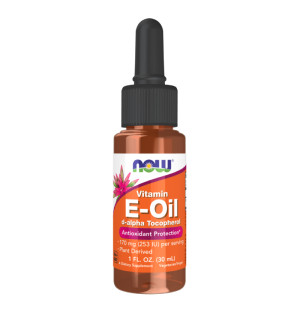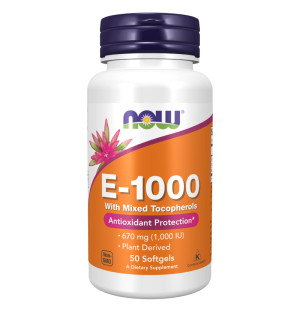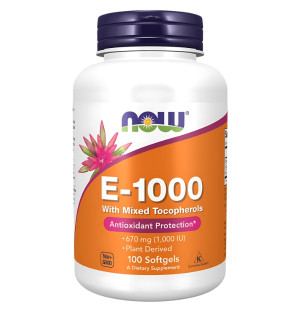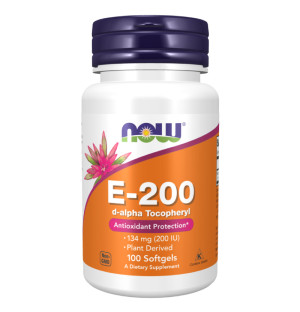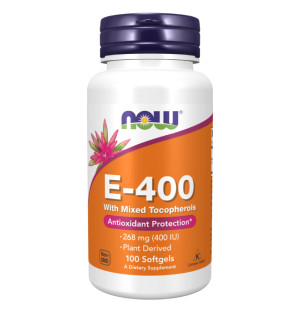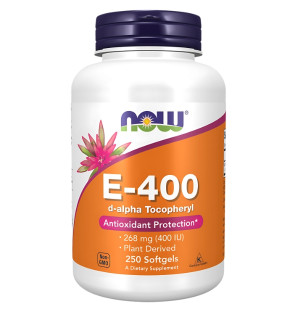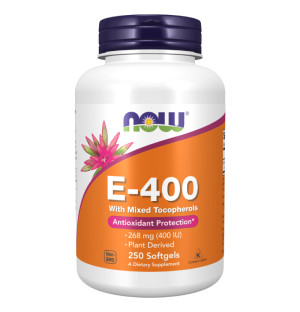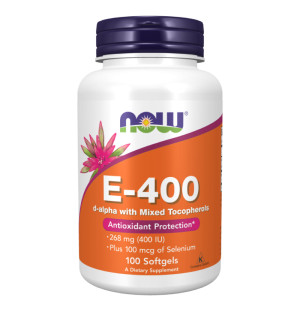Vitamin E
Vitamin E - cell protection, skin health and immune system support
Vitamin E is a group of fat-soluble compounds with powerful antioxidant properties that protect cells from oxidative stress and support the health of the skin, hair, eyes and cardiovascular system. Vitamin E, known as the 'vitamin of youth', is crucial for maintaining the integrity of cell membranes, immune system function and supports cell regeneration. Its antioxidant properties neutralise free radicals, which can damage cells and accelerate the ageing process.
Vitamin E occurs naturally in the form of eight compounds: four tocopherols (alpha, beta, gamma, delta) and four tocotrienols. The most active biological form, which is most commonly used in supplements, is alpha-tocopherol. Vitamin E comes in both natural (D-alpha-tocopherol) and synthetic (DL-alpha-tocopherol) forms. Vitamin E supplements are a popular choice for those concerned about skin health, the immune system and support for cardiovascular function.
Role and health benefits of vitamin E
✅ Powerful antioxidant protection: Vitamin E acts as one of the body's most important antioxidants, neutralising free radicals that can damage cells and contribute to the development of chronic diseases such as atherosclerosis, heart disease and cancer. Free radicals are also responsible for accelerating the ageing process, so vitamin E helps to protect cells from premature ageing and degeneration.
✅ Skin and hair health: Vitamin E is widely used in skincare products for its ability to moisturise, promote cell regeneration and protect against UV damage and environmental pollutants. Vitamin E helps to reduce wrinkles, scars and other signs of skin ageing. It also strengthens hair, preventing excessive hair loss and promoting healthy growth.
✅ Immune system support: Vitamin E supports the function of the immune system, helping to protect the body from infection. It works by stimulating the production and activity of immune cells, such as white blood cells. Thanks to its antioxidant properties, vitamin E protects immune cells from damage caused by oxidative stress, which increases the body's resistance to infection and disease.
✅ Cardiovascular health support: Vitamin E supports cardiovascular health by protecting blood vessels from oxidative stress damage. It can help lower LDL cholesterol (so-called 'bad cholesterol') and reduce the risk of atherosclerotic plaque build-up in the arteries, reducing the risk of heart disease and heart attacks. Vitamin E also improves the elasticity of blood vessels, which supports healthy blood circulation.
✅ Supporting eye health: Vitamin E, with its antioxidant properties, protects retinal cells from free radical damage, which can reduce the risk of developing age-related eye diseases such as cataracts and macular degeneration. Regular supplementation with vitamin E supports eye health, especially in people at risk of vision problems.
✅ Supporting regenerative processes: Vitamin E supports tissue regeneration, which is particularly important for wound healing and skin cell regeneration. Its anti-inflammatory properties help to reduce inflammation in the skin and other tissues.
Forms of vitamin E
-
Natural D-alpha-tocopherol: This is the most bioavailable and active form of vitamin E from natural sources such as vegetable oils, nuts, seeds and green leafy vegetables. Vitamin E supplements based on natural D-alpha-tocopherol have higher efficacy in the body than synthetic forms.
-
Synthetic DL-alpha-tocopherol: This is a synthetic form of vitamin E that is less bioavailable than natural D-alpha-tocopherol. Although it is cheaper, the body absorbs it less efficiently, meaning that a higher dose may be needed to achieve the same benefits as natural vitamin E.
-
Mixed tocopherols: This is a complex of different forms of vitamin E (alpha, beta, gamma, delta) that act synergistically to provide a broad spectrum of health benefits. Mixed tocopherols provide more balanced antioxidant protection and are considered more versatile than the alpha-tocopherol form alone.
-
Tocotrienols: These are lesser-known forms of vitamin E that have stronger antioxidant properties than tocopherols. Tocotrienols can be particularly effective in protecting the heart and circulatory system and in reducing inflammation. They are mainly found in palm oil, rice oil and cereal bran.
Symptoms of vitamin E deficiency
- Muscle weakness: Vitamin E supports muscle health and a deficiency can lead to muscle weakness and difficulty recovering from exercise.
- Neurological problems: Vitamin E deficiency can affect the health of the nervous system, leading to neuropathy, coordination and balance problems.
- Vision problems: Vitamin E deficiency can lead to retinal damage and other vision problems, especially in older people.
- Dry and flaky skin lesions: A lack of vitamin E can manifest as dry, irritated and flaky skin and problems with wound healing.
Who should consider vitamin E supplementation?
❎ Those concerned with skin and hair health: Vitamin E helps maintain healthy and youthful-looking skin, promotes cell regeneration and prevents premature skin ageing.
❎ People with weakened immunity: Vitamin E strengthens the immune system, supporting the body to fight infections.
❎ People with cardiovascular disease: Vitamin E supports cardiovascular health by helping to lower LDL cholesterol and improve circulation.
❎ People exposed to oxidative stress: Smokers, people living in polluted environments and those subjected to high levels of stress can benefit from vitamin E supplementation, which protects cells from oxidative stress.
❎ People with fat absorption problems: Vitamin E is fat-soluble, so people with fat absorption problems may be at greater risk of deficiency.
Summary
Vitamin E is a key antioxidant that supports cell health, the immune system, the cardiovascular system and the condition of the skin and hair. With its powerful protective properties, vitamin E helps to neutralise free radicals, prevent premature ageing and support eye and cardiovascular health. Regular supplementation with vitamin E is particularly important for those at risk of oxidative stress, looking to improve skin and hair health and strengthen their immunity. Vitamin E is available in a variety of forms, including natural tocopherols, synthetic tocopherols and mixtures of tocopherols and tocotrienols, allowing supplementation to be tailored to individual health needs.

